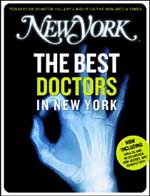
Patients are getting their monthly gamma-globulin I.V.’s at Mount Sinai Hospital. Clipboard in hand, Dr. Charlotte Cunningham-Rundles works the room, huddling with each of them. “You don’t want to treat it like a filling station, where people just gas up and go home,” she says, explaining why she insists on supervising such a routine procedure. “They won’t tell you the little things unless you’re there.” The “little things” are what count for Cunningham-Rundles, director of Mount Sinai’s immune-deficiency program, which treats 500 patients. “Charlotte’s one of the main reasons I’m alive,” says Linda Gonzalez, a patient. “She talks to us all the time,” agrees Susan Davis: “As crummy as you feel, she makes you feel much better.” Though frequently misdiagnosed, primary immune deficiency, or PI, is thought to affect one in 10,000 people, the same incidence as leukemia and lymphoma combined. While some symptoms mimic those of aids, PI is genetic rather than acquired, and rarely fatal if treated. Gamma-globulin infusions – a treatment pioneered, in part, by Cunningham-Rundles – supply missing antibodies, but some PI patients also need bone-marrow or stem-cell transplants. Trim and well tailored, Cunningham-Rundles has a light southern accent (she spent twenty years in North Carolina) that makes words like antigen and plasma sound positively sweet. She was recruited from Memorial Sloan-Kettering back in 1986 – a big coup for Mount Sinai – and in addition to treating patients, she does important drug research and teaches in the medical school. That makes her the kind of “triple threat” much coveted by major teaching hospitals, but what her colleagues still find most remarkable is her way with patients. “She has this incredible capacity to make them feel like they’re the center of the universe,” says Dr. Lloyd Mayer, chairman of the immunology division. “If there’s a special test they need, she’ll track it down.” Cunningham-Rundles sees no disconnect between daily patient work and research. “The most important thing,” she says, “is to take the latest lab developments and apply them to patient care.”